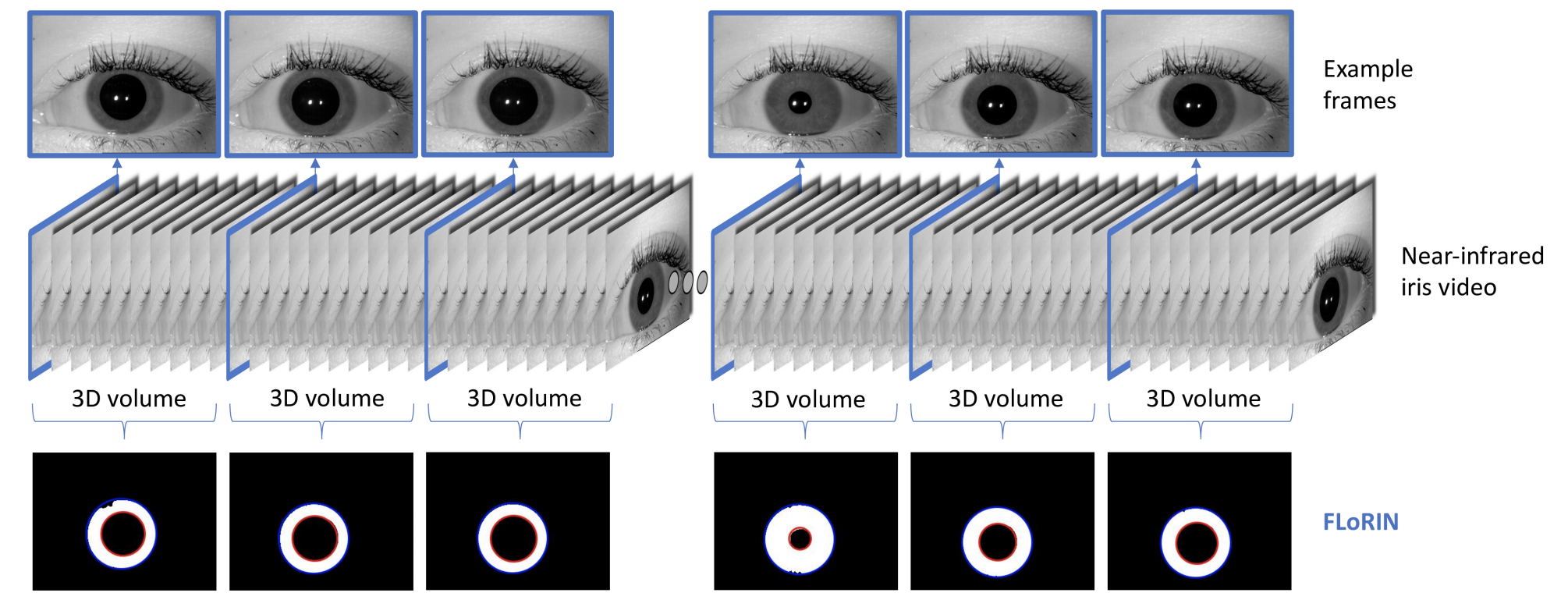Learning-free Image Segmentation
Fall 2015 - Spring 2019
Description
Deep learning has, in many ways, revolutionized the analysis of images in many fields, including neuroscience and human biometrics. However, it is not the only way to approach problems like neuron segmentation or iris segmentation. Legitimate criticisms of deep learning exist in the form of long training times, the need for large amounts of hand-labeled training data, and the complexity of optimizing various hyperparameters. And frustratingly, even when all of these problems have been addressed for a single dataset or operational scenario, the move to a different setting forces one to start all over again. Generalization remains an open problem within the field of machine learning at large.
Our turn back to learning-free methods is a direct response to this dilemma. Elaborate training regimes leaning on massive data collection and annotation efforts can be dispensed with in favor of immediate inference operation. A move to a new dataset or acquisition setting may be as simple as making a few adjustments to a minimal set of free parameters before deployment. Several decades worth of work on image processing and computer vision should not be ignored — the literature is filled with older techniques that can be updated for today's problems to achieve remarkable performance gains and avoid the generalization dilemma. The Flexible Learning-Free Segmentation and Reconstruction for Neuronal Circuit Tracing (FLoRIN) approach is just one example of this.
This work was supported by IARPA contract #D16PC00002, the NVIDIA Corporation, and the Argonne Leadership Computing Facility, which is a DOE Office of Science User Facility supported under Contract DE-AC02-06CH11357
Publications
- "Learning-free Iris Segmentation Revisited: A First Step Toward Fast Volumetric, , , ,
Operation Over Video Samples,"
,IAPR International Conference On Biometrics,June 2019.[pdf] [code][bibtex]@article{DBLP:journals/corr/Kinnison19,
author = {Jeffery Kinnison and
Mateusz Trokielewicz and
Camila Carballo and
Adam Czajka and
Walter J. Scheirer},
title = {Learning-Free Iris Segmentation Revisited: A First Step Toward Fast Volumetric Operation Over Video Samples},
journal = {CoRR},
volume = {abs/1901.01575},
year = {2019},
url = {https://arxiv.org/abs/1901.01575}
}
- "Flexible Learning-Free Segmentation and Reconstruction for Neuronal Circuit Tracing,", , , , , ,
, , , , ,
,Scientific Reports,September 2018.[pdf] [code][bibtex]@article {Shahbazi278515,
author = {Shahbazi, Ali and
Kinnison, Jeffery and
Vescovi, Rafael and
Du, Ming and
Hill, Robert and
J{\"o}sch, Maximilian and
Takeno, Marc and
Zeng, Hongkui and
da Costa, Nuno Ma{\c c}arico and
Grutzendler, Jaime and
Kasthuri, Narayanan and
Scheirer, Walter J.},
title = {Flexible Learning-Free Segmentation and Reconstruction for Neuronal Circuit Tracing},
journal = {Scientific Reports}
volume = {8},
number = {14247},
year = {2018},
}
- "Reconstruction of Genetically Identified Neurons Imaged by Serial-Section Electron Microscopy,", , , , , ,, , , ,eLife,July 2016.[pdf][bibtex]@article{Joesch_2016_eLife,
author = {Joesch, Maximilian and Mankus, David and Yamagata, Masahito and Shahbazi, Ali and Schalek, Richard and
Suissa-Peleg, Adi and Meister, Markus and Lichtman, Jeff W. and Scheirer, Walter J. and Sanes, Joshua R.},
title = {Reconstruction of Genetically Identified Neurons Imaged by Serial-Section Electron Microscopy},
journal = {eLife},
volume = {5},
pages = {e15015},
year = {2016}
}
